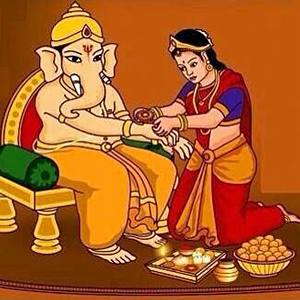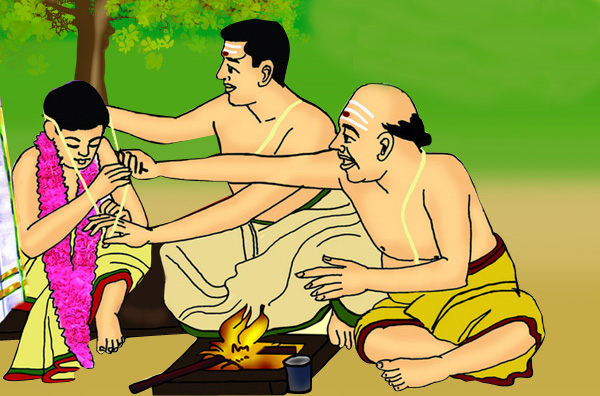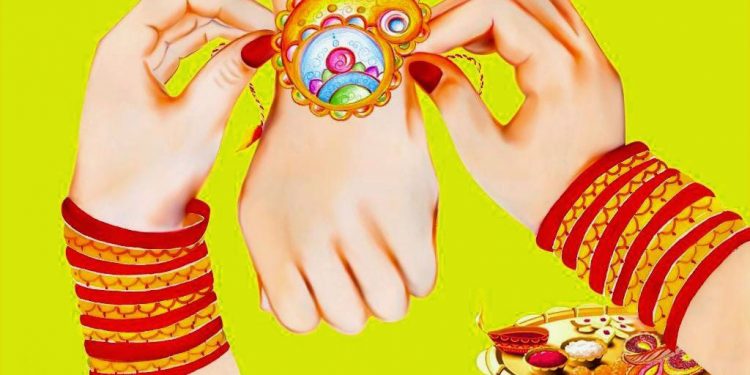The Rakhi tradition is associated with beliefs, rituals and merriment in addition to certain legends. Some celebrations are replete with rituals while others are linked to mythology. Though Rakhi is not celebrated across India, the Poornima (full moon) day is celebrated in different ways in different states.
Birth of Goddess Santoshi

According to the Puranas, Lord Ganesha’s sons Kshema and Labha see their aunt Jyoti tying a thread around the wrist of their father and taking home a gift. Curious to learn about the significance of the piece of thread that begets gifts, they asked their father. Ganesha explains that it was no ordinary thread but a bond that strengthens the sibling relationship. The brothers then demand a sister.
Saint Narada also advises Ganesha that a daughter can bring joy and enrich his life. To fulfil his sons’ desire, Lord Ganesha creates a girl with his special powers. The girl ties a sacred thread around their wrists and in return gets chickpeas and jaggery. As the young girl was satisfied with what she got and doesn’t seek riches, she is named Santoshi (Goddess of Satisfaction) and the day is also celebrated as the birthday of Devi Santoshi.
Indrani ties Rakhi
The tradition of tying a sacred thread for protection is part of Indian culture and mythology.
According to mythology, Indrani, the wife of Lord Indra, ties a thread she had obtained from Lord Vishnu around her husband’s wrist to protect him during a war with demons. Another mythological story describes how Lord Indra once loses a war with demons and, disappointed, he complains to Brihaspati who then prepares a protective thread for Indra. The rain god wears it for his protection during the war and it works.
The epic Mahabharata has a reference to Kunti, the mother of Pandavas, tying a sacred thread on her grandson Abhimanyu to protect him during a war.
Humayun takes on Bahadur Shah
Queen Karmavati, widow of Maharana Sangram Singh of Mewar, had sent an envoy to Humayun with a rakhi seeking his help as her ‘‘brother’’ when the kingdom was attacked by Gujarat’s Sultan Bahadur Shah. Humayun, who was a little late in responding failed to protect the Queen, but he valued the rakhi and kept his vow by defeating Bahadur Shah and handing over the kingdom to Karmavati’s son.
King Puru and Roxana
Alexander the Great, who invaded India in 326 BC, fought against King Puru. Alexander’s wife Roxana sent a sacred thread to King Puru urging him not to harm her husband during the war. Because of this pledge, Puru is believed to have left Alexander unharmed.
Tagore’s Rakhi celebration
Nobel laureate Rabindranath Tagore had organised a rakhi celebration including Hindus and Muslims with a view to integrating them and opposing the British policy of partition. The festival helped spread the spirit of fraternity among the communities all over India. Consequently, the partition that was about to happen in 1905 did not take place in the face of stiff resistance.
Rakhi as a festival is celebrated not only by Hindus, but also by Jains, Sikhs and some Muslims across India. In Maharashtra, the day is observed as Narali Poornima wherein fishermen pray for prosperity and throw coconuts into the sea. Brahmins celebrate the occasion as Balev, a day for changing their holy threads.
Women of Rajasthani and Marwari communities tie Rakhi on the bangles of their brother’s wife. This is called Lumba rakhi.
People in Madhya Pradesh, Chhattisgarh, Uttar Pradesh and Bihar celebrate the day as Kajari Purnima. Farming communities worship Goddess Bagwati and seek blessings for a good harvest.
The day is celebrated as Jhulan Poornima in some parts of the country and in the culmination of the five-day ritual, Lord Krishna and Radha swing on a decorated Jhula (swing). The Jhulan festival starts on Shravan Ekadashi and culminates on the full moon day.
Traditionally, Odia people decorate domesticated cows and bullocks and rakhis are tied around them as part of Gamha Purnima. The day is believed to be the birthday of Lord Balaram, who represents agrarian culture. Farmers traditionally worship ploughs. Sweet dishes and rice cakes stuffed with grated coconut are prepared on this day.

People in Gujarat celebrate Pavitropana along with the Rakhi festival. Both the festivals are celebrated on the same day. Gujarati women worship Lord Shiva and pour water, milk, coconut water, honey and curd on Shivlingas at temples.
In Kerala and Tamil Nadu, the day is celebrated as Avani Avittam. In Nepal, it is observed as Janeu Poornima. Purified by Vedic mantras, the sacred thread is worn by some communities on this day.
SOYONG, OP






































